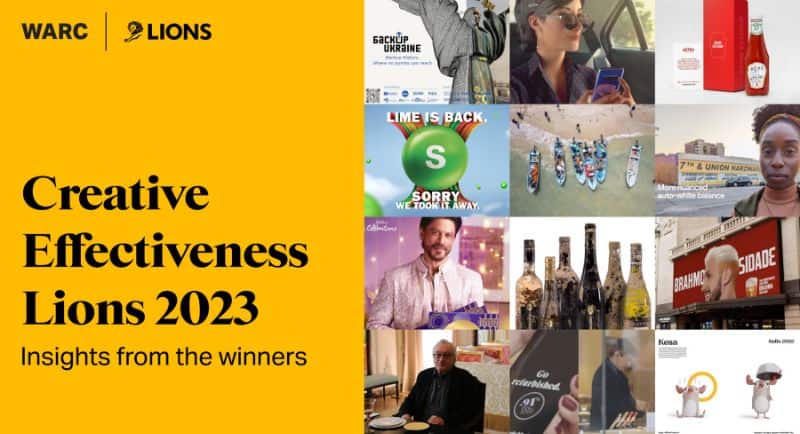WARC has released ‘Creative Effectiveness Lions 2023 – Insights from the winners’, a report identifying trends and themes common to the award-winning campaigns of this year’s Cannes Creative Effectiveness Lions, celebrating the measurable impact of creativity.
Based on judges’ commentary, and interviews with winners and industry experts, the WARC report reveals what an award-winning creative effectiveness entry looks like and provides practical tips and best practices for future entry papers. In addition, a data lens has been applied to the winners to reveal the most common media and creative strategies used in this award-winning body of work.
Commenting on the report, Amy Rodgers, head of content, WARC Creative, said: “Findings in this study are critical to understanding how marketers are meeting business goals and driving sustainable impact over time. The winners of this category are unquestionably creative and now awarded for their effectiveness too. They are simple but disruptive ideas that really work to drive business growth.”
On the winners, jury president Devika Bulchandani, global CEO, Ogilvy, said: “The winning cases did the fundamentals of marketing in a brilliant manner. They used brand equity – both brand and product – and then used creativity to amplify that equity which led to strong business results.”
The four key themes highlighted in the ‘Creative Effectiveness Lions 2023 – Insights from the winners’ report are:
• Finding joy and levity
After a few years of decline in humour in advertising, 2022 saw an uptick and this year’s creative effectiveness winners reflected a more light-hearted approach, even to serious issues. Humour is memorable, distinctive and persuasive, and people gravitate towards positive emotions.
‘Invaluable Food’ by Leo Burnett for food festival Madrid Fusion, ‘Hack Market’ by Marcel Paris for online marketplace Back Market, and ‘Apologize the Rainbow’ for confectionary brand Skittles by DDB Chicago, all used this strategy to their advantage in very different campaigns.
Gaetan du Peloux, chief creative officer, Marcel Paris, said: “Just because a subject is serious or heavy or critical doesn’t mean the communication about it has to be the same. Serious can easily become boring, heavy can easily become polarizing, and critical can easily become paralyzing.”
• Distinctive assets become the campaign
This year’s creative effectiveness category winners saw brand equity in distinctive assets used at the core of the campaign: the assets became the idea.
This was the case for ‘Foamy Haircut’ by Africa São Paulo for Brazilian beer brand Brahma and ‘Draw Ketchup’ for sauce brand Heinz Ketchup by Rethink Canada. They both applied creativity to their product iconicity and tapped into the emotional connection that consumers have with brands they love.
On the award-winning Heinz campaign, Julian Morgan, group strategy director, Rethink, said: “Almost every brief starts with the importance of the decades of equity the brand [Heinz] has built. Our thinking is that if these pieces of equity linger in people’s heads, then half the battle is done.”
• Redefining purpose
There’s a shift in purpose from brands driving change not as an obligation but as an opportunity to create shared value; benefiting both the business and the challenge or issue they are aligned with.
The Grand Prix, ‘Shah Rukh Khan My Ad’, for chocolate brand Cadbury by Ogilvy Mumbai, created shared value by supporting the supply chain for its Celebrations product in India by promoting small businesses.
Commenting on the Grand Prix winning campaign, jury member Tahaab Rais, group chief strategy officer, Publicis MENAT, said: “The smart thing with this campaign was how they weaved the product into the story. The product was integral, but the story was bigger than just the product. The story was a big brand, doing a big act, for a big occasion. Using its product but also serving the community at large.”
• Driving fame through earned media
Be it to create behavioural change, drive ticket sales or raise money, winners harnessed the power of earned media to generate mass attention and participate in culture. Reflecting this change, the use of word-of-mouth as both a media channel and an objective, is up this year.
The crowdfunding campaign ‘Our Worst Vintage’ by Seven.One Ad Factory for wine brand Flutwein, relied on the power of donated and earned media to reach, and raise, millions.
Summing up, WARC’s Amy Rodgers added: “Each of the winners exhibited the principles of creative effectiveness: there was strong objective setting; strategy was contextual, relevant and insightful; distinctive assets were out in force; budgets were balanced across brand and performance; and the use of emotion shone through. The judges were unanimous in their feeling that this was work they wished they had been a part of.”
Included in the ‘Insights from the 2023 Cannes Creative Effectiveness Lions’ WARC report are:
• In-depth exploration of the themes, including expert commentary and behind-the-scenes features from the winners.
• Summaries of winning case studies including results, takeaways and judges’ comments.
• Data analysis covering campaign objectives, creative strategies, media mix, hard and soft metrics, budgets and durations.
• Top tips for effectiveness entries, including judges’ advice to future entrants and best practice examples.
• How advertisers, agencies and media owners can apply the lessons from the analysis.
See also: AI, sustainability, and going back to brand basics: Cannes 2023 wrap-up
